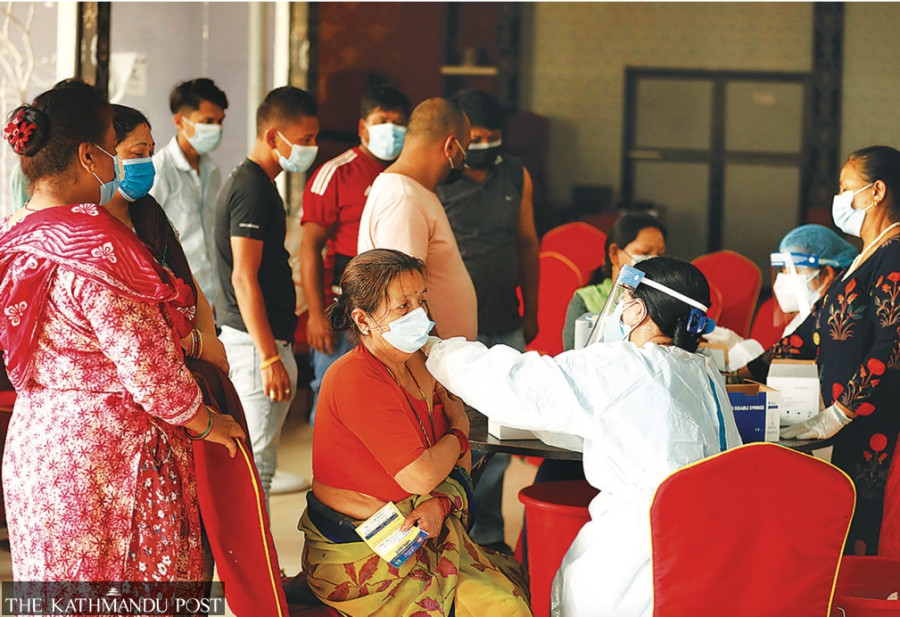Health
Covid jabs to be given from over 16,000 immunisation centres across the country
Public health experts say authorities should launch a door-to-door campaign to immunise the unvaccinated population against the coronavirus.
Arjun Poudel
As the deadline to immunise all eligible people comes closer, the Ministry of Health and Population has decided to administer Covid-19 vaccine from over 16,000 immunisation centres throughout the country.
The decision of the ministry also aims to address problems related to storage of vaccines by administering more doses at the earliest.
“We will administer Covid-19 vaccines from over 16,000 vaccination centres throughout the country,” Birodh Khatiwada, minister for health and population, told the Post. “I have directed all agencies concerned to start preparations accordingly.”
The ministry said over 16,000 immunisation centres, which are being used for childhood immunisation, will be used for Covid-19 vaccination.
Minister Khatiwada said that the vaccination services will start from next week.
“I am in Hetauda right now and I am also inaugurating a vaccination centre,” said Khatiwada.
Besides the immunisation centres, vaccination booths will also be set up in all community schools of 57 districts to administer Moderna vaccine to children between 12 and 17 years old.
The ministry has decided to provide Moderna vaccine received from the COVAX facility, the United Nations backed international vaccine sharing scheme, to the children of the said age group from December 20.
Nepal on Thursday received 719,000 doses of Janssen vaccine developed and manufactured by Johnson & Johnson from the COVAX facility.
It is part of the 2.17 million doses of Janssen vaccine provided by the German government through COVAX.
The second consignment of the remaining doses is scheduled to arrive on Friday, the Ministry of Health and Population said.
“We have received 719,000 doses of the Janssen vaccine from the COVAX facility,” Dr Surendra Chaurasia, the chief of the Logistic Management Section under the Department of Health Services, told the Post. “The second consignment is scheduled to arrive tomorrow [Friday].”
Nepal appears to be on track to vaccinating all its eligible population, as vaccines are arriving in huge numbers, as supply of more doses have become certain.
Officials said that due to the huge supply of the doses they are facing logistical issues, including storage.
Officials said that the government has communicated to COVAX and other vaccine providers to delay shipments.
An official at the Department of Health Services, who did not wish to be named, said: “If all the vaccines that are in the pipeline come at once, we will face storage problems.”
Public health experts have said that authorities concerned should launch a door-to-door campaign to increase the vaccination pace and immunise those who have been deprived of the vaccine due to various reasons.
“Until now, we have been asking the people to come for vaccination at certain immunisation centers,” said Dr GD Thakur, former director at the Epidemiology and Disease Control Division. “The same strategy is not going to work if the government wants to increase the vaccination coverage. Health authorities should change strategy and visit every household to ascertain if any eligible person has missed the jab.”
Over 51,000 female community health volunteers, social workers, local clubs, area development committees, teachers and others could be mobilised to inoculate the unvaccinated, according to Thakur.
Experts warned that if the government doesn't change the strategy, the risk of wastage of millions of doses of vaccines will grow. Moreover, the government’s aim of inoculating all eligible people by mid-April will also not be met.
“By using the available doses, we can effectively prevent another possible new wave of the pandemic as well as loss of lives,” said Dr Keshab Deuba, a public health epidemiologist. “When we have sufficient doses, human resources and unvaccinated people, why not make an extra effort to immunise all eligible population.”
So far, Nepal has received 29.73 million doses of Covid-19 vaccines—Vero Cell, AstraZeneca, Janssen, Pfizer-BioNTech and Moderna.
Nepal launched its Covid-19 vaccination campaign on January 27 with 1 million doses of Covishield vaccine gifted by India. Covishield is the AstraZeneca type vaccine manufactured by the Serum Institute of India.
The Health Ministry said that 9,468,489 people (31.2 percent of the total population) have been fully vaccinated as of Thursday.
Nepal needs to vaccinate around 78 percent of its over 30 million estimated population, or around 25 million people, as per the government’s new plan that includes vaccinating those aged between 12 and 18 years.
Earlier, the government had planned to vaccinate only those aged 15 years and above.




 22.12°C Kathmandu
22.12°C Kathmandu















